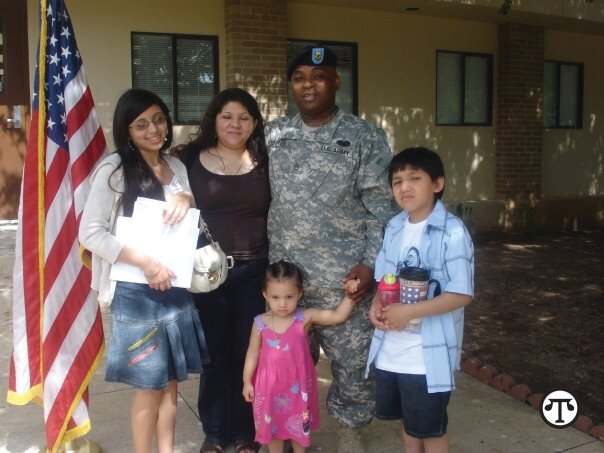FOR YOUR HEALTH: Volunteer Finds Community in Military and Veteran Caregiver Network

The Towler family takes a portrait at Fort Cavazos (previously Fort Hood) just months before a permanent change of station to Germany. Photo courtesy of Betty Towler
(NAPSI)—If you or someone you care for is ever among America’s more than 2 million military personnel or in their families—or even if you’re not—here’s a story you may find inspiring:
Betty Towler met her husband, U.S. Army Sergeant First Class Nigel Towler, over 20 years ago while stationed in Korea. When they returned stateside, Towler made a professional sacrifice for her family.
“I had to leave the military because my husband was deploying. We already had two kids.”
When her husband returned from Iraq in 2005, Towler started noticing changes.
“He was with us all the time when he came back. He wanted to hang out with his family, but he was drinking and that wasn’t normal.”
Towler had her hands full, raising two children with another on the way and impending permanent change of station orders to Germany. A month later, her husband deployed a second time to Iraq.
“We all felt it when he came back the second time. He would be there, but he was not there. The TV would be on, but he wasn’t watching it. His mind was somewhere else,” Towler recalls. “We could be sitting on the couch and he’s on one end and I’m on the other and it’s like an awkward but a very scary silence. It was like a void. And I felt I could fall into this darkness, and nobody was going to come for me, and nobody was going to help me.”
Towler said she tried seeking help but found little support as a dependent overseas. They turned to religion, but that didn’t bring her family the solace they were seeking either. When they returned stateside in 2011, little had changed.
“Everything was just so overwhelming,” Towler said. “All the things people were telling us to do, all the appointments. It was all too much. Even visiting with family: he hears everybody being loud, laughing and his brain was like, ‘I can’t do this. There are too many conversations going on at the same time. I love them but I can’t be around them. It’s too chaotic,’ he said. He’d be down for 2 to 3 days trying to recover from just hanging out with other adults.”
Then in 2020, the COVID-19 pandemic occurred, but their family was largely unaffected. In fact, Towler sees it as a blessing. It gave them time to focus on their health.
“I signed up for a lot of webinars and a lot of online courses,” she shared.
One of these resources was the American Red Cross Military and Veteran Caregiver Network (MVCN), a secure, online community that acts as both a resource directory and peer support network to over 12,000 military-affiliated caregivers. Using evidence-based peer-support programs, caregivers connect, share knowledge, learn new skills, and gain hope. Towler found support and solace from others just like her. Empowered by her newfound communities, she exercised her voice.
“We had to set boundaries. I was like, no, we need to tell them that we can only do two or three appointments in one week. It was too much. I had to learn to speak up, speak up for him and speak up for us.”
Now a Red Cross volunteer, Towler has been involved with the MVCN for the past five years, giving support to other military-affiliated caregivers going through the same challenges she did.
“We have about four calls a month. We’ll have some Zooms and some Slack chats just to really check in with the caregivers. I love how the older caregivers will share their experiences, like, here’s what we had to do, here’s the changes that happened in my house. Being part of this reminded me that I spent so much time caring for this one person, I forgot to make friends.”
Towler cares for her husband following his two deployments to Iraq, and the Military and Veteran Caregiver Network helps her do that by also helping her care for herself.
Learn More
For more information or to join the MVCN community, visit redcross.org/caregivers.
Responsible journalism is hard work!
It is also expensive!
If you enjoy reading The Town Line and the good news we bring you each week, would you consider a donation to help us continue the work we’re doing?
The Town Line is a 501(c)(3) nonprofit private foundation, and all donations are tax deductible under the Internal Revenue Service code.
To help, please visit our online donation page or mail a check payable to The Town Line, PO Box 89, South China, ME 04358. Your contribution is appreciated!


Leave a Reply
Want to join the discussion?Feel free to contribute!